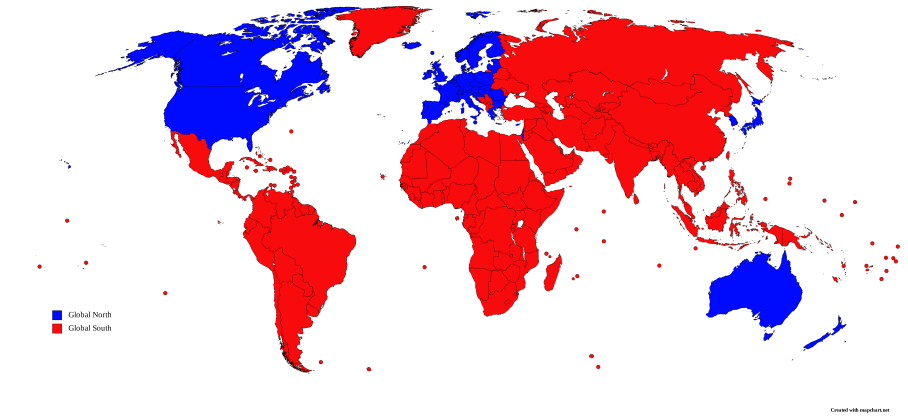(Inequality) Tag: Visual edit |
(Results of colonialism) Tag: Visual edit |
||
| Line 6: | Line 6: | ||
The term [[Third World]] is a disambiguation; it referred to underdeveloped capitalist countries which were not totally aligned with either bloc during the [[Cold War]].<ref>World of Education; First. Second and Third World ([https://mundoeducacao.uol.com.br/geografia/primeiro-segundo-terceiro-mundo.htm In Portuguese])</ref> The term "developing countries" is misleading, as it ignores the fact that their development is impeded by already developed countries that either maintain them as client states or make them [[Dependency|economically dependent]] on export/imports from the rich parts of the world.<ref name=":0" /> | The term [[Third World]] is a disambiguation; it referred to underdeveloped capitalist countries which were not totally aligned with either bloc during the [[Cold War]].<ref>World of Education; First. Second and Third World ([https://mundoeducacao.uol.com.br/geografia/primeiro-segundo-terceiro-mundo.htm In Portuguese])</ref> The term "developing countries" is misleading, as it ignores the fact that their development is impeded by already developed countries that either maintain them as client states or make them [[Dependency|economically dependent]] on export/imports from the rich parts of the world.<ref name=":0" /> | ||
In 1960, the richest 20 countries were 18 times as rich as the 20 poorest countries in terms of GDP per capita. This ratio grew to 37 times in 1995.<ref name=":1222">{{Citation|author=[[Vijay Prashad]]|year=2008|title=The Darker Nations: A People's History of the Third World|chapter=Conclusion|page=277|pdf=https://cloudflare-ipfs.com/ipfs/bafykbzaceascnzh26r5d6uitjjs2z7rflhaxlt7rboz5whzdf76qg6xxvecqq?filename=%28A%20New%20Press%20People%27s%20history%29%20Vijay%20Prashad%20-%20The%20darker%20nations_%20a%20people%27s%20history%20of%20the%20third%20world-The%20New%20Press%20%282008%29.pdf|publisher=The New Press|isbn=9781595583420|lg=https://libgen.rs/book/index.php?md5=9B40B96E830128A7FE0E0E887C06829F}}</ref> | In 1500, the average income in [[Europe]] was only three times higher than in [[Africa]] and [[Asia]], but that difference grew to ten times by 1960.<ref name=":12222">{{Citation|author=[[Vijay Prashad]]|year=2008|title=The Darker Nations: A People's History of the Third World|chapter=Buenos Aires|page=66|pdf=https://cloudflare-ipfs.com/ipfs/bafykbzaceascnzh26r5d6uitjjs2z7rflhaxlt7rboz5whzdf76qg6xxvecqq?filename=%28A%20New%20Press%20People%27s%20history%29%20Vijay%20Prashad%20-%20The%20darker%20nations_%20a%20people%27s%20history%20of%20the%20third%20world-The%20New%20Press%20%282008%29.pdf|publisher=The New Press|isbn=9781595583420|lg=https://libgen.rs/book/index.php?md5=9B40B96E830128A7FE0E0E887C06829F}}</ref> In addition, in 1960, the richest 20 countries were 18 times as rich as the 20 poorest countries in terms of GDP per capita. This ratio grew to 37 times in 1995.<ref name=":1222">{{Citation|author=[[Vijay Prashad]]|year=2008|title=The Darker Nations: A People's History of the Third World|chapter=Conclusion|page=277|pdf=https://cloudflare-ipfs.com/ipfs/bafykbzaceascnzh26r5d6uitjjs2z7rflhaxlt7rboz5whzdf76qg6xxvecqq?filename=%28A%20New%20Press%20People%27s%20history%29%20Vijay%20Prashad%20-%20The%20darker%20nations_%20a%20people%27s%20history%20of%20the%20third%20world-The%20New%20Press%20%282008%29.pdf|publisher=The New Press|isbn=9781595583420|lg=https://libgen.rs/book/index.php?md5=9B40B96E830128A7FE0E0E887C06829F}}</ref> | ||
== References == | == References == | ||
Revision as of 19:27, 30 June 2023

In geopolitics, the Global South (sometimes abbreviated to GS) is a general term that roughly designates the economically exploited capitalist economies, in contrast, the Global North (GN) are the most advanced capitalist countries,[1] whose wealth was largely generated from their colonial pasts and their modern involvement in imperialism.[2]
It's important to note that as this is a geopolitical term, some leeway must be accounted for. For example, China is generally considered by financial institutions to be part of the South, despite them soon achieving the highest GDP in the world. Israel is considered to be part of the Global North, due to its close relationship with and its strategic importance to the Global North ex-colonial powers.[3]
The term Third World is a disambiguation; it referred to underdeveloped capitalist countries which were not totally aligned with either bloc during the Cold War.[4] The term "developing countries" is misleading, as it ignores the fact that their development is impeded by already developed countries that either maintain them as client states or make them economically dependent on export/imports from the rich parts of the world.[2]
In 1500, the average income in Europe was only three times higher than in Africa and Asia, but that difference grew to ten times by 1960.[5] In addition, in 1960, the richest 20 countries were 18 times as rich as the 20 poorest countries in terms of GDP per capita. This ratio grew to 37 times in 1995.[6]
References
- ↑ IGI Global Publisher Dictionary, "What is Global North/South?"
- ↑ 2.0 2.1 LENIN; Vladimir, Imperialism: The Highest Stage of Capitalism (Read on Marxists.org)
- ↑ Maps of the World, What is the division between the Global North and the Global South?
- ↑ World of Education; First. Second and Third World (In Portuguese)
- ↑ Vijay Prashad (2008). The Darker Nations: A People's History of the Third World: 'Buenos Aires' (p. 66). [PDF] The New Press. ISBN 9781595583420 [LG]
- ↑ Vijay Prashad (2008). The Darker Nations: A People's History of the Third World: 'Conclusion' (p. 277). [PDF] The New Press. ISBN 9781595583420 [LG]